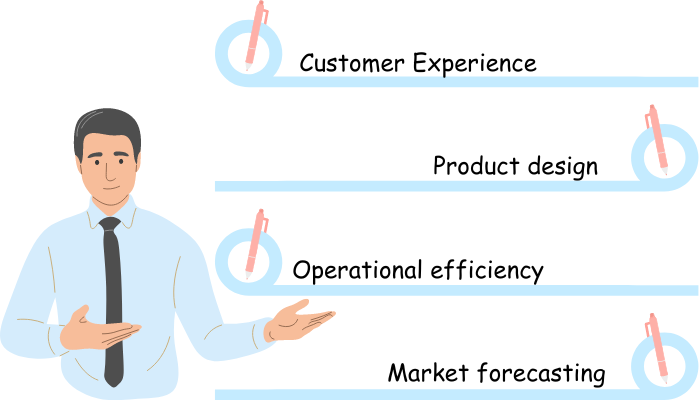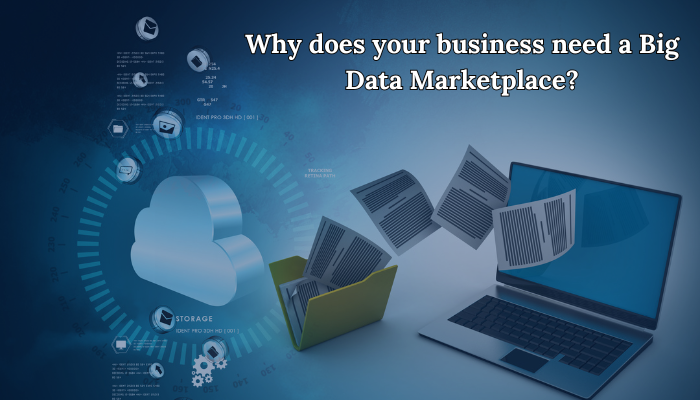Data already is a plural, voluminous form of singular Datum. Big data is also data but ferocious and coming at you at supersonic speed. To give you some context, Eminem’s Rap God a thousand times over. Phew. Three key attributes characterize big data, often referred to as the three Vs – variety, velocity, and volume. In simpler terms, big data is a complex, incredibly large, and abundant collection of information. It’s so vast and intricate that traditional in-house data processing software simply can’t keep up. Despite this, big data has emerged as one of the greatest assets organizations could leverage to stay ahead. Since managing data of such complexity and volume in-house is difficult, a big data marketplace comes as a respite. A marketplace platform stores data for a transactional exchange between entities and is a smart way to deal with all that data.
Before we understand why businesses require a big dataset marketplace, let’s have a look at why holding on to big data is vital for modern businesses.
So, what makes big data so desirable for organizations?

The advent of Metaverse and social media channels such as Facebook, Instagram, and YouTube realized the concept of big data. The unstructured, low-density raw data was stored and analyzed via open-source frameworks such as Hadoop, Spark, and NoSQL. These open-source frameworks made storing and processing data cheaper and easier to work with. Now, we have more and more data coming with IoT and predictive capabilities like ML and AI. The best part is that we have just started with big data, and its implications are yet to be unraveled in their full glory.
Given the enormity and extent of information it holds, big data has enabled organizations and decision leaders to get the full picture and make data-driven decisions. Be it customer experience, product development, market forecasting, operational efficiency in supply chain or logistics, business owners can be more confident about their decisions.
We all know Sondergaard’s famous saying, “Data is the new oil…” so we will specifically talk about big data analytics use case here. Big data helps businesses integrate data from all touchpoints (e-commerce websites, apps, dashboards, internal or external sources, supplier data, or shipping data) to present a holistic picture, and analytics corroborate it all to give decision-makers a sorted and seamless view.
Also read: Using data analytics solutions for business decision-making.
Here’s how.

Customer Experience:
Businesses have always wanted to be omnipresent. They want to reach where their customers are. Social media and digital transformation have made it possible to a larger extent. However, this also implies that companies deal with a lot of customer data spanning social media, customer care channels, surveys, trade fairs, and offline stores. Big data analysis can help make sense of your customers’ sentiments and voices. It provides you with information that you can use to make your processes or products better. For instance, if customers are taking to X (Formerly Twitter) to complain about after-sales support in a specific area, you can find the broken link and understand the root cause. Maybe the support staff is new, or is it a product flaw? Is the water too hard that it clogs the equipment and renders it useless? Or is it a negative sentiment floating against your company? Apart from analyzing support calls, businesses can also reflect on credit reports and financial transactions to understand what makes their customers tick. E-commerce businesses can analyze clickstream to understand cart abandonment and clickthrough rates. Marketing teams can also create better customer acquisition and retention strategies to increase repeat customers at lesser costs.
Also read: B2B Customer Retention Strategies – How To Retain Your Best B2B Clients.
Product design:
Listening to your customers has several benefits. One of them is figuring out what makes them tick. FMCG companies and FAANG use predictive analysis to understand the demands and expectations of a product. If you are an avid Netflix watcher, you must be seeing thumb buttons upon the completion of a show. This rating option is to provide its users with better recommendations, understand their likes and preferences, content personalization, and invest more in programs that are predicted to be more likable and a hit. Product companies can use it to drive innovation in product line-ups and processes. They can also use it to tweak a faulty product line to increase the product’s market viability and for price optimization.
Operational efficiency:
Businesses can use big data to find lags and loopholes in their business processes. Operational efficiency is one of the core areas in which big data analysis has the most impact. Predictive analysis and assessment of big data can reveal loopholes in supply chains, inventory levels, and manufacturing pipelines. Identifying the pattern can reduce stock-outs and anticipate demands or even saturation in the market, leading to a better grasp of the market and controlled growth in adverse times. Fintechs and BFSI use big data analytics to detect suspicious transactional activity and identify fraud in real-time. Similarly, in the Agritech world, smart machines, GPS-equipped tractors, and soil sensors are decoded using big data analytics to bring forth the trend of precision farming.
Market forecasting:
In 2023, the global market for big data analytics was valued at USD 307.51 billion and is expected to grow to USD 924.39 billion by 2032. Big data analytics can help businesses predict user behavior, monitor market trends, and track competition. Companies can leverage data-driven insights to deliver new products or services that fulfill their customers’ expectations.
However, despite being so promising and having lots of potential, big data isn’t all roses and sunshine. Processing and analyzing it to identify patterns and correlations comes much later. The first and foremost issue is to store it. Many businesses are omnichannel, so data comes from online and offline stores. Then there are connected devices, cross-functional teams operating in silos, non-technical teams generating data, social media, apps, and so on. As a result, companies are flooded with data with little to no understanding of where to store it, let alone what to do with it. As this quite popular infographic, ‘Data Never Sleeps’ puts it, data is ever-evolving, and with each swipe, stream, and click, it adds on. This brings us to the second problem. Keeping the data up-to-date.
The third challenge that businesses face with big data is cleaning it. What goes around, comes around. The GIGO analogy with data is 100% facts. Hence, the data businesses must rely on for insights and decisions is clean, relevant, verified, and latest. It shouldn’t have duplicated values and should be organized to derive meaningful analysis. Easier said than done.
This is where the data analytics marketplace comes into the picture.
A big data marketplace is like Amazon or eBay for data. Individuals and businesses have similar access to data, and regardless of one’s technical prowess, they can download the required data in a spreadsheet or proprietary software. By enabling data democratization and data monetization, a data marketplace ends data monopoly and levels the playing field for businesses. It allows businesses to embrace a data-driven culture and leverage data intelligence by offering democratic self-service access to the kind of data they require. There is absolutely no need for technological prowess, and buying a dataset is as easy as shopping on an e-commerce site.
Also read: Exploring the role of data marketplace in your business’s success.
Here’s how a data marketplace tackles the challenges of big data and makes it easier for businesses:

Easy access to external commercial data:
To propagate a data-first culture at the workplace, it is quite crucial that businesses have access to lots of diverse external pools of data so that they can cross-reference and validate their internal data against it. With the data market, crowdsourcing data has become possible, and data engineers can leverage a rich pool of datasets to train AI models and conduct predictive analytics. Data marketplace platforms provide access to data that is beyond their reach and capabilities. Since the data is cleaned and structured, the core teams can work on it and utilize their productive hours. This easily available ready-to-query data from a dataset marketplace helps financial institutions monitor financial fraud and identity theft.
Similarly, the healthcare industry uses data marketplaces to derive insights from anonymous patient records, clinical research, and health data for health mapping and predictive healthcare. E-commerce and retail businesses use marketplace data to have a sound understanding of the market and to know their audience better. The extensive, external, and ready-to-use data of a marketplace platform gives the data teams an elaborate canvas to work with. The more data they have, the more information they have to correlate with and reveal patterns from.
Decentralizing and democratizing data:
Data marketplaces have leveled the playing field for small and medium businesses and individuals worldwide. It is the opportunity to thrive in a data-rich ecosystem. They prompt businesses to foster a data-first, data-driven culture by making data accessible in a secure ecosystem. A data marketplace platform is enabling a borderless world empowered by data intelligence. The best part is that while businesses have access to a treasure trove of data from all sources, it is without any compromise on security and quality. Users- data providers and buyers must meet KYC and security requirements. The data stewards and governing entities of a data marketplace ensure that data is sourced or obtained consensually and legally. The available data should comply with international legal and ethical standards as well as CCPA and GDPR regulations. Most modern decentralized data marketplaces have blockchain encryptions in place to monitor data streams and protect users’ privacy. Certain kind of data is prohibited and blocked for ethical and legal reasons. The data sellers can only start selling the data on a platform after being carefully vetted and authorized. Users can also share their reviews, ratings, and feedback- lending credibility and transparency to the entire data commerce facilitated by a data marketplace.
Besides, businesses don’t have to worry about data protection, either. The data marketplace management takes care of the costs and efforts to store, manage, and de-dupe the data. The auditors are in charge of security protocols, including blockchain encryption and verification.
Also read: How bad data is harming your company and how can you be on its good side?
Efficient and silo-free collaboration:
Since data is deduped and verified, IT heads, and data engineers don’t have to worry about verifying or processing it before using it to derive meaningful insights. The data is no longer in silos, and non-technical teams can also access it to put it within the context and use it to analyze patterns. This leads to a shared understanding of the information available, achieving shared goals. Using a data marketplace also helps eliminate redundant requests raised by multiple teams within a data ecosystem, optimizing work hours and resulting in better data fluency and collaboration within internal teams.
Since data marketplaces provide a trusted and secure environment for data sharing and exchange, a data marketplace economy also leads to fruitful collaboration between external entities.
Data Monetisation:
Data can literally be the new currency. Data sharing through a data marketplace has enabled companies to offer data-as-a-service and monetize it. Although in its nascent stage, it is slowly gaining momentum as the world wakes up to its full potential. For instance, Verizon and Deutsche Telecom analyzed customers’ data to improve their internal business operations and customer experience. The same aggregated and anonymous data was sourced to healthcare institutions, government agencies, and financial institutions for effective planning, smart targeting, and fraud detection. Honda Motor has launched a new business to sell aggregated data generated by connected and smart vehicles, an industry that is touted to be worth USD 400 billion. The automobile company has also partnered with Nightley, a Tokyo-based location data start-up, to monitor drivers’ behavior and gauge customers’ demands. Internally, companies can use the data to improve business processes and leverage from insights, and externally, they can either sell their raw data or insights they have built on, creating a new revenue stream out of the digital gold they possess. Companies can sell their data on-demand or via customization to their clients.
Agile business processes:
More often than not, data engineers struggle to access pertinent and verified data for problem-solving. Dataset marketplaces solve this challenge for them by making ready-to-query data available to them. Data engineers and scientists can get right to the work, creating streamlined and more efficient business processes.
Types of Data Marketplace Platforms
While big data is vital in businesses’ growth strategy, businesses are also finding a revenue opportunity in them. A public marketplace platform is relatively popular in businesses of all sizes for automating data commerce and being user-friendly. A private and proprietary data marketplace is also becoming a preferred choice of companies that want to go all out to derive deeper insights and study analytics in detail. The latter has its limitations because it caters to one specific industry type and is more prone to demand fluctuations. As the name suggests, it is a private B2B data marketplace, and entities with permission can access the data listed. Since it offers data for a particular type, it could run low on external data sets to correlate with. Still, it can be immensely beneficial for companies looking for niche and reliable data for their internal business decisions. Along with these two types is a third model called white label data marketplace. White labeling works like any other e-commerce concept. Companies interested in monetizing data use a marketplace architecture of other companies, customize it, and market it as their own.
Also read: Understanding Data Mining With the Help Of Case Studies On Data Mining In Market Analysis.
How does BizProspex fulfill your business’ strategic expectations?

BizProspex data marketplace works like any other e-commerce site. A data buyer would browse, compare, buy the dataset assets, and review them after purchase. Our data marketplace gives businesses an opportunity to optimize their data costs and improve business processes. Having access to ready-to-query, processed, de-duped, clean, large pools of pertinent and verified data at one stop is a bonus for businesses of every size and type. Besides, businesses don’t have to spend time on storage and managing it because our data auditors and stewards ensure that your data requirements are met and there is no compromise with security and quality. We cater to tailor-made data requests as well. Irrespective of the size of your business and type of data requests, our data marketplace platform pushes the envelope on data-first culture without adding to the operating costs. Secured with blockchain technology and equipped with generative capabilities, our data marketplace caters to an extensive range of data sets and industry requirements. Our data marketplace architecture is scalable and evolves with your needs. It has a built-in cost management feature and works on a pay-as-you-go model. We are just a click away if you are looking for granular data control at the enterprise level.
Apart from that, we would be happy to assist you should you want to explore a white-label data marketplace platform and find a data marketplace architecture provider. Contact us here to learn more about our B2B data marketplace services and solutions.
